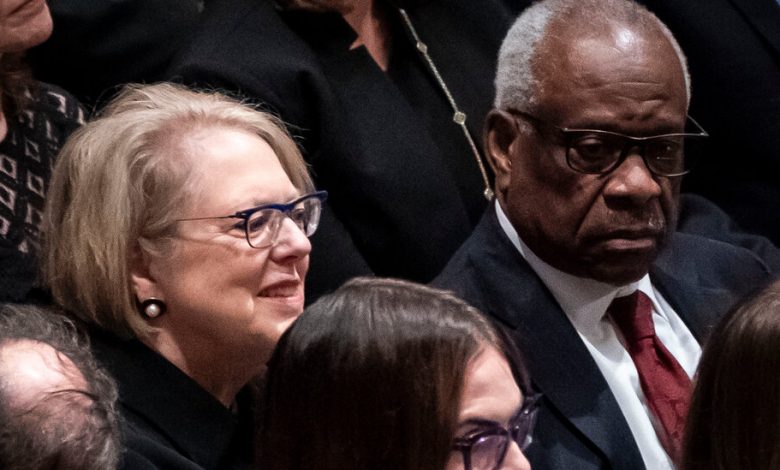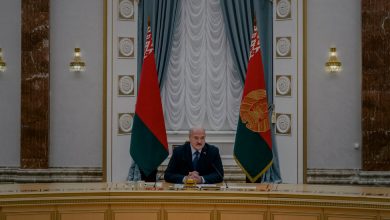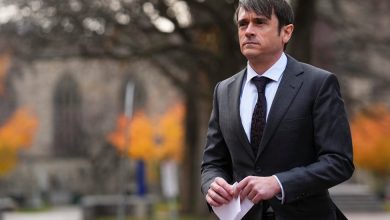Clarence Thomas Threatened to Resign Over Salary Concerns in 2000

Justice Clarence Thomas pressed congressional lawmakers for a higher salary early in his tenure on the Supreme Court, threatening to resign and inspiring a campaign by Republican backers to meet his demands, according to a memo addressed to the chief justice in June 2000.
The memo, reported earlier by ProPublica and obtained by The New York Times, underscores the financial pressures Justice Thomas may have faced at the time and laid bare some of the accompanying political risks were Congress to increase the pay of the justices. The memo was contained in Chief Justice William H. Rehnquist’s papers held at the Hoover Institution at Stanford.
According to the memo, written by a top official of the federal courts system, L. Ralph Mecham, Justice Thomas broached the issue of pay with Representative Cliff Stearns, Republican of Florida. Salaries at the Supreme Court were unsatisfactory, the justice said, and “one or more justices will soon leave” if compensation were not increased.
Those concerns prompted Mr. Stearns’s office to seek help from a lobbying group affiliated with the Podesta brothers to draft a bill that would bolster justices’ pay. In doing so, a lobbyist asked for guidance from an array of federal judges, raising reservations about the request and worry about how best to respond.
In 2000, Justice Thomas’s salary, that of an associate justice on the court, was $173,600 a year — more than $300,000 today. (Justice Thomas and the other associate justices are paid $285,400 a year now.)
In a letter to Justice Thomas obtained by ProPublica, Mr. Stearns outlined the specifics of their conversation, vowing to examine the issue of pay. “I intend to look into a bill to raise the salaries of members of the Supreme Court,” he wrote. “As we agreed, it is worth a lot to Americans to have the Constitution properly interpreted.”
“His importance as a conservative was paramount,” Mr. Stearns told ProPublica in a recent interview. “We wanted to make sure he felt comfortable in his job and he was being paid properly.”
The Supreme Court did not immediately respond to a request for comment.
In the memo addressed to Chief Justice Rehnquist, Mr. Mecham cited the conversation and asked for his advice in handling “this delicate matter.”
Under Mr. Stearns’s proposal, Mr. Mecham wrote, an amendment would separate the pay of justices from that of all other judges, as well as from those of members of Congress and the cabinet. He would also establish a commission that would study the salaries of justices.
Mr. Mecham’s letter to the chief justice questioned the wisdom of even pushing Congress to approve a pay raise for Supreme Court justices.
“Within the judiciary, that could run the risk of looking like a dog in the manger type approach,” he wrote. “To Congress, it could be seen as another judiciary effort at delinkage from congressional pay, which even our best friends have refused to do, although it would be limited solely to justices, which might make it more palatable. But I am not at all sure.”
“From a tactical point of view, given the public statements made largely by Democratic lobbyists,” Mr. Mecham continued, “it will not take the Democrats and liberals in Congress very long to figure out that the prime beneficiaries who might otherwise leave the court presumably are Justices Thomas and Scalia.”
That year, Chief Justice Rehnquist echoed those concerns about pay in a year-end report that cited “what I consider to be the most pressing issue facing the judiciary: the need to increase judicial salaries.”
The revelations about Justice Thomas’s complaints add to the debate about ethics on the Supreme Court and his personal finances, which have repeatedly led him to seek the counsel and support of billionaire donors.
Around that time, Justice Thomas was carrying heavy debt. A year earlier, Justice Thomas took out a $267,230 personal loan from Anthony Welters, a health care industry magnate, to buy a recreational vehicle that for years he failed to repay in full.
Abbie VanSickle contributed reporting.




